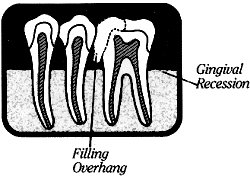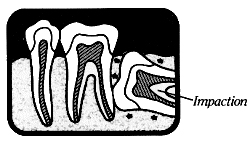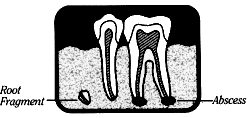DENTAL X-RAY SAFETY
Today, more than ever, patients are concerned about the safety of X-rays in general, as well as the need for them in the dental office. This page is intended to all of your questions.
Are all X-rays the same?
Actually there are several types of X-rays that may be ordered by the dentist. The most common are what are referred as "intra oral," a small film packet is placed inside your mouth. You may be asked to bite on a small cardboard tab that holds a cavity-detecting X-ray film packet in place; or you may be asked to bite down on a small plastic device that helps align the film with the X-ray machine.
Other types of X-rays (called "extra oral") are taken by placing a larger film cassette near your face. You may be either seated or standing while the film is being taken.
What about radiation safety?
 That's a commonly asked question and we're glad you are concerned. Radiation, in the amounts used to expose dental, X-rays, is very small. In fact, the average American actually receives more radiation from sitting in front of the family television for a period of one year than from routine X-rays taken at the dentist's office!
That's a commonly asked question and we're glad you are concerned. Radiation, in the amounts used to expose dental, X-rays, is very small. In fact, the average American actually receives more radiation from sitting in front of the family television for a period of one year than from routine X-rays taken at the dentist's office!
Are X-rays necessary every time I have a checkup?
Not necessarily. The need varies from patient to patient. X-rays are taken to detect conditions or diseases present in the mouth. Depending upon the finding of your clinical examination, your dentist will determine when X-rays are necessary for you.
What are you looking for when you read my dental X-rays??
One of the obvious things we look for, of course, is decay. (Often dental decay is not apparent upon visual examination. That's because the decay process often starts between the teeth.)
In addition to decay, there are many other things that the dentist looks for on your X-rays:

- Receding bone level ( a sign of periodontal disease)
- Supernumerary (extra) teeth
- Missing, impacted or unerupted teeth
- Bone cancer or bony cysts
- Early signs of osteoporosis
- Root fragments
- Root configuration
- Sinus infection
- Abscesses of the teeth or gums
- Tooth position
- Foreign objects that may be imbedded in the oral tissue
- Hairline fractures of the teeth or supporting tissues
- Tarter (hardened plaque) below the gumline
- Filling overhangs or short or open filling margins
- TMJ (jaw joint) irregularities
What if I think there's a chance I may be pregnant?
Will X-rays harm my unborn baby?
It's true that embryonic tissues are very sensitive to X-radiation. If you are in the first trimester of pregnancy (the first three months) or think you may be pregnant, please tell us. We generally avoid taking films during this time, unless you have a specific dental emergency.
Once you are past the first trimester, if there is reason for taking X-rays, we will take every precaution to protect you and your unborn baby from any harmful radiation.
What precautions are taken?
 We protect patients of all ages with a lead apron. This apron is draped over your shoulders and protects you from your neck to mid-thighs. Because of the reproductive organs are also sensitive to X-radiation, we are very careful to protect these areas when taking dental films.
We protect patients of all ages with a lead apron. This apron is draped over your shoulders and protects you from your neck to mid-thighs. Because of the reproductive organs are also sensitive to X-radiation, we are very careful to protect these areas when taking dental films.
Today's film manufacturers make ultra-speed films which require as little as 1/10th of a second actual exposure. They also permit the lowest level of radiation possible to produce clinically acceptable diagnostic X-rays.
Why do dental personnel leave the room when they take my X-rays?
Because dental personnel take many films over the course of a year, they must take precautions against what is called "cumulative X-radiation." The safest way to ensure this is for them to stand at least six feet from the X-ray unit for a brief fraction of a second when radiation is present.
Sometimes I feel like I'm going to gag on an X-ray film. Do other patients experience this, too?
Yes, occasionally patients do experience what we call a "gag reflex" when a film packet is placed in the mouth, particularly toward the back of the mouth. If you feel that you are especially prone to gagging, we can give you a special mouth rinse that temporarily numbs the soft tissue (what is called the plate).
Your dental health is our first concern
Because we care about maintaining your smile, dental X-rays are an indispensable adjunct to your clinical records. By taking them periodically we safeguard your dental health, to detect any changes or conditions early before they become big problems.
If you have any additional questions or concerns about dental X-rays, just contact us. We are here to preserve your smile.
Back to top




